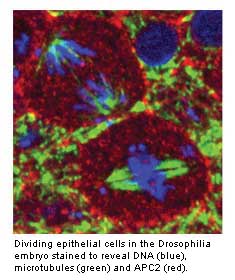
Undergraduate Chris Stern didn’t take a typical summer job waiting tables. Rather, he chose to delve into one of science’s most challenging puzzles—how we learn. Working in the lab of Assistant Professor of Biological Sciences Alison Barth, Stern was part of an ongoing effort to observe and understand the timing of neuronal activation in living animals as they perceive and experience their surroundings.
To literally “see” some answers, Stern optimized a molecular construct that includes the gene c-fos, which turns on when neurons are activated, as well as Timer, a fluorescent protein that changes color over time. Barth hopes to use this construct to determine when and for how long particular neurons have been active.
Stern joined Barth’s lab as part of a select group of undergraduates participating in Carnegie Mellon’s Research Experiences for Undergraduates (REU) program, a 10-week summer program that introduces students to academic research.
Stern—who hopes someday to earn his Ph.D.—applied to the REU program because it allowed a more involved research experience than had been possible in his science courses at St. Vincent’s College in Latrobe. As he and other undergraduates work alongside professors in the lab, they learn valuable lessons not only about basic scientific research, but also about the confusion that comes with it.
“Research often involves feeling more confused as you make progress, arriving at findings that lead to even more questions,” said David Hackney, REU program director and professor of biological sciences. “It’s also creative in that researchers often need to devise new models to fit expanding bodies of data.”
Run by Carnegie Mellon’s Department of Biological Sciences and funded by the National Science Foundation, the REU program gives students the opportunity to conduct advanced mentored research projects in labs of faculty who specialize in such areas as molecular biology and genetics, cell and developmental biology, neuroscience, biochemistry, structural biology and computational biology. Admission to the program at Carnegie Mellon is selective and competitive, with fewer than one in ten applicants accepted.
“The REU program gives college students a taste of research at the graduate-school level,” said Associate Professor of Biological Sciences Brooke McCartney, a 1992 Carnegie Mellon REU alumna who now co-directs the program and serves as a faculty research mentor.

Early in the program, students design projects in cooperation with their faculty research mentors. By the end of the summer, they generate results that, for past REU students, have landed them as co-authors on papers in major scientific journals, including Biochemistry and Molecular Biology of the Cell.
Many REU students find the research core of the program to be a defining moment in their early scientific careers – with students moving from undecided about their scientific careers to firmly committed to continuing as researchers. In recent years, nearly 70 percent of alumni of Carnegie Mellon’s REU have entered Ph.D. programs in the sciences. The rest have gone to medical school or directly into scientific employment.
This past summer, Claudia Lins, a senior at Montclair State University in New Jersey majoring in molecular biology, worked in the lab of A. Javier López, an associate professor of biological sciences. She helped López’s research team address a genetic puzzle: how an activity called recursive RNA splicing functions in the processing of large genes. Lins focused on sites in a gene of the fruit fly Drosophila that are suspected to be key to recursive splicing. She generated mutations at the sites to see how these specific mutations affect the process of recursive splicing as a whole. Her work, together with that of López and other researchers in the lab, could have profound implications for research on the molecular basis of life-threatening diseases like cystic fibrosis.
Before her experience in Carnegie Mellon’s REU program, Lins was considering master’s degree programs in science. Now, she said she will definitely pursue a Ph.D. Of scientific research, she said, “This is what I was born to do.”
Related Links:
Research Experience for Undergraduates
Alison Barth
David Hackney
Brooke McCartney
A. Javier López



